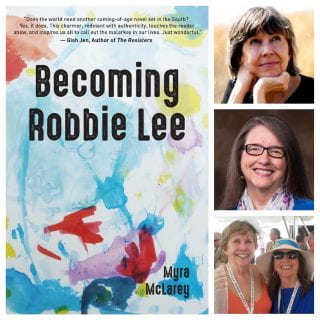Historians Discuss New Novel That Explores Social Justice in 1950s Arkansas, Oct. 27
 Join award-winning authors and educators Jeannie Whayne and Myra McLarey in conversation about McLarey’s new novel, Becoming Robbie Lee, virtually via Zoom at 6:30 p.m. Tuesday, Oct. 27.
Join award-winning authors and educators Jeannie Whayne and Myra McLarey in conversation about McLarey’s new novel, Becoming Robbie Lee, virtually via Zoom at 6:30 p.m. Tuesday, Oct. 27.
Participants can join the free event by visiting the talk’s Facebook event listing, where the Zoom information is listed.
Sponsored by the U of A’s Fulbright College of Arts and Sciences and its Diane D. Blair Center of Southern Politics & Society, their talk will cover the book and its themes related to the movements for social and racial justice.
“What do you do when the right thing to do is considered the wrong thing by everyone in your safe and secure world? In the summer of 1952, the summer before she turns eleven, Robbie Lee McElroy is faced with this question,” said author Myra McLarey, a multiple-award winning teacher who has taught history at the U of A, in Missouri, in Maine and at Harvard University.
McLarey’s three literary novels, Water from the Well, The Last Will and Testament of Rosetta Sugars Tramble, and her latest, Becoming Robbie Lee, are all set in Arkansas and rely heavily on material from McLarey’s years of collecting Black oral histories from people in their nineties.
McLarey said Becoming Robbie Lee explores its namesake’s life in a tiny southwest Arkansas village, where she has a best friend, a brother and sister she loves, and most importantly, “a momma and daddy who make her feel loved and protected.”
But McLarey said when Robbie Lee has to take part in caring for her cantankerous dying grandmother, she starts a journey of discovery.
“She begins to see that she is part of a system she has never named — but has always understood as the way things are,” McLarey said. “And Robbie Lee’s realization of this double world — the ideal world she lives in and the falseness that lies therein — comes to her largely by observing the courage of those she has been raised not to see as courageous. Seeing such courage in action changes her understanding of what — and who — truly matters.”
McLarey will be joined by Jeannie Whayne, University Professor of history, and author of two award-winning books, Delta Empire: Lee Wilson and the Transformation of Agriculture in the New South and A New Plantation South: Land, labor, and Federal Favor.
Whayne is also a multiple award-winning teacher and a specialist in agricultural and southern history. Her research focuses on the lower Mississippi River Valley and the interplay of social and economic history with environmental change, agricultural development, and race relations.
Whayne will bring this expertise to the conversation, contextualizing Robbie Lee’s fictionalized experiences against the realities of Arkansas past and Arkansas today.
“This should be a fascinating discussion and timely look at how the social and racial justice movement has changed and evolved in Arkansas,” said Todd Shields, dean of Fulbright College. “We are excited to bring these two outstanding scholars together for an evening that promises to be full of entertainment and enjoyment, and also to explore the deeper meaning of the world around us — which is the very heart of what studying the humanities aims to do.”
About the Diane D. Blair Center of Southern Politics & Society: The Blair Center in the University of Arkansas’ Fulbright College of Arts and Sciences, is a research center established in 2001 with a 3 million-dollar U.S. Congressional appropriation that was put into an endowment. The center was named for the late Diane Blair, professor of political science, Clinton friend and strategist, and public advocate for Arkansas women.
About the University of Arkansas: The University of Arkansas provides an internationally competitive education for undergraduate and graduate students in more than 200 academic programs. The university contributes new knowledge, economic development, basic and applied research, and creative activity while also providing service to academic and professional disciplines. The Carnegie Foundation classifies the University of Arkansas among fewer than 3% of colleges and universities in America that have the highest level of research activity. U.S. News & World Report ranks the University of Arkansas among its top American public research universities. Founded in 1871, the University of Arkansas comprises 10 colleges and schools and maintains a low student-to-faculty ratio that promotes personal attention and close mentoring.

